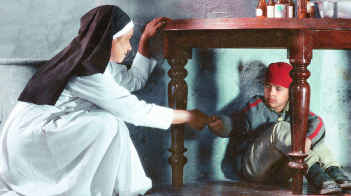Amu, Kaya Taran and Khamosh Pani
 This is a still from Kaya taran
This is a still from Kaya taran This is a still from Amu
This is a still from Amu This is a poster from Khamosh Pani
This is a poster from Khamosh PaniSaw Amu, the "fictional account of the real events of the Delhi riots, of 1984". I had tried to see it last week, and it was sold out, so tried again and got tickets today. And after watching it, was positively disappointed. It was not well edited, and had too many stories going on. It had a Bengali family story, combined with a rich government official’s son coming of age, a mother-daughter relationship, a girl who has been adopted trying to figure out who her birth parents were. The slums of Trilokpuri were brought in, where the American Indian, Kaju was filming.
I felt films like Kaya Taran and Khamosh Pani were much stronger and tighter made films, with a lot more impact, since they focused on the issues more intensely and with greater clarity and depth.
The strong elements of the film, were toward the end, when the scenes of the riots were recreated. Am not sure why the Delhi Railway Station was featured so prominently. Trilokpuri, where the riots happened, is not in that area. The scene in the train compartment, when ordinary people helped save two Sikh men was well done. The burning of the Sikh man on the street, and his wife begging the police officer for help was powerful. The widows in the relief camps were a poignant reminder, but what they were saying was not made clear. The conversations between Keya and Shanoo Kaur, were strong, when Shanoo said "What Justice? Can my husband or son be ever brought back? Can my daughter’s brother or father be their for her? What does Justice mean?"
But I could not figure out the connection between the tea stall owner and Kaju’s father. Were they part of the same story, or another sub plot? Also the mother’s, (played by Brinda Karat), relationship with the man she met over coffee, who commended her on the good decision that she made? What was that decision, who was Neil?. They were so many loose ends in the movie, that it was falling apart by the end, without any closure, other than figuring out who Kaju’s birth parents were?
The Anti-Sikh riots of 1984 riots were brutal, organized and obfuscated from history text books. What happened during those days in November needs to be clearly spelt out and articulated, people need to see what happened to many Sikh families, and the politicians, police officers and local mob goondas need to be brought to justice. Some attempt has been made by the Manmohan Singh administration, but not enough. A truth commission like that in Bosnia, Rwanda and South Africa needs to be instituted, and the victims need to be heard. Not hidden away in another resettlement colony, without recourse to mental health facilities or income generation programs.

Comments